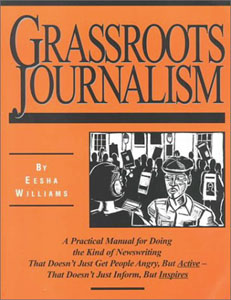![[MetroActive Books]](/gifs/books468.gif)
[ Books Index | Santa Cruz | MetroActive Central | Archives ]
Media Mash
UCSC grad pens useful guide to doing journalism in the trenches
By Sarah Phelan
EESHA Williams is a down-to-earth kinda guy.
When I call to interview him about Grassroots Journalism, his new manual about community based reporting, he asks me to hold. I wait and hear strange clankings across the phone.
"Sorry," says Williams, a little breathless, getting back to me a moment later. "I was loading the laundry."
It comes as no surprise then, that Grassroots Journalism is a down-to-earth kind of book.
"A practical manual for doing the kind of news writing that doesn't just get people angry, but active--that doesn't just inform, but inspires," says the subtitle.
And that's no lie.
Williams says he wrote Grassroots Journalism to fill a gaping hole. "I'd been working for independent weeklies in New York and Illinois and the experience had opened my eyes to the world of noncorporate journalism. But I discovered that there were no textbooks on grassroots reporting," he says.
Santa Crustaceans may remember Williams from his days as a community studies major at UCSC. His 1994 Fish Rap Live! article about Wells Fargo and UCSC's plans to develop the last coastal meadow in Santa Cruz triggered the formation of the Terrace Point Action Network, a grassroots coalition that fought back.
Williams defines grassroots-style journalism as "making the decisions to go out into the community and find the issues that (1) are closest to the people's daily lives, (2) make them angry, (3) are winnable through collective action, and (4) lead into longer struggles to be undertaken by people who will gain a new sense of confidence and understanding of the systems of power and privilege, fear and submission, that define our society at the new millennium."
This book is accessible to anyone frustrated by mainstream reporting and should become much more than just another journalism textbook.
Williams, who is on tour promoting his book, says he typically reads a little from his book, but mostly wants to hear what people think of the media, and to discuss those views.
"Often, I'll ask the audience, 'How many of you want to be writers or editors?' Not many hands will go up. The truth is that most people are frustrated with the mainstream media. Fourteen million people still belong to a union, they are the largest social organization--but you'd think from reading most newspapers that the unions barely exist and that those that do are all corrupt."
Williams' book has received praise from Ralph Nader and three-time Santa Cruz mayor Mike Rotkin. Says Rotkin, "The kind of journalism Eeesha is promoting gives people a better sense of the choices that are being confronted by the decision makers, and how they can get involved."
Grassroots Journalism includes chapters on how to find issues that will get audiences agitated and agitating, objectivity as advocacy, and the nuts and bolts of writing grassroots news stories, along with a look at the media's coverage of strikes and its discouragement of activism. The extensive guide to groups, books and publications in the resource section is extremely useful.
This reviewer enjoyed the section on minimizing on-the-job stress as a grassroots journalist: "Keep your work in perspective. You are more than your job. The article you are working on now isn't going to save the world. So do the best you can, on the time you have, then forget about it. This is not a good career for perfectionists."
[ Santa Cruz | MetroActive Central | Archives ]
Copyright © Metro Publishing Inc. Maintained by Boulevards New Media.
![]()

Grassroots Journalism
By Eesha Williams
Apex Press; 185 pages; $22.95; paper
From the February 21-28, 2001 issue of Metro Santa Cruz.